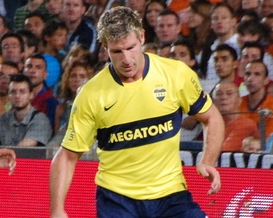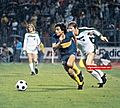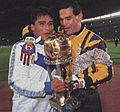Intercontinental Cup (football) facts for kids
| Organising body | UEFA CONMEBOL |
|---|---|
| Founded | 1960 |
| Abolished | 2004 |
| Region | Europe South America |
| Number of teams | 2 |
| Related competitions | UEFA Champions League Copa Libertadores |
| Last champions | (2nd title) |
| Most successful club(s) | (3 titles each) |
The Intercontinental Cup was a big international football competition. It was organized by two major football groups: UEFA (for Europe) and CONMEBOL (for South America). Teams from Europe and South America played against each other. Usually, the winners of the UEFA Champions League (Europe) played against the winners of the Copa Libertadores (South America).
This exciting cup ran from 1960 to 2004. After 2004, the FIFA Club World Cup took its place. For a few years, from 2000 to 2004, both cups were played at the same time. The Intercontinental Cup was also known as the European/South American Cup. From 1980 to 2004, it was called the Toyota Cup because the car company Toyota sponsored it.
From 1960 to 1979, the competition usually had two matches between the same teams. If the teams were tied, they would play a playoff match until 1968. After that, penalty kicks decided the winner. In the 1970s, some European teams were not sure about playing. This was because of some rough events in the 1969 final. So, some European champions chose not to play.
From 1980 onwards, the competition became a single match. All these matches were played in Japan. The car maker Toyota sponsored the event and even gave out a special "Toyota Cup" trophy. The Japan Football Association helped organize the matches. However, UEFA and CONMEBOL still approved the tournament.
The very first team to win the cup was Spanish team Real Madrid in 1960. They beat Peñarol from Uruguay. The last winner was Portuguese team Porto in 2004. They won against Colombian team Once Caldas in a penalty shoot-out. The competition ended in 2004 and joined with the FIFA Club World Cup in 2005.
Contents
The Trophy
The main trophy for the competition has the words "Coupe Européenne-Sudamericaine" on it. This means "European-South American Cup." At the bottom, you can see the UEFA logo and a map of South America.
When Toyota sponsored the cup, they also gave out a second trophy. This trophy was called the "Toyota Cup".
Match Results
Here's a look at how the matches were won:
| Match was won during extra time | |
| Match was won on a penalty shoot-out | |
| ‡ | Play-off match where teams were tied on points (1 win and 1 defeat each) |
| # | European runner-up contested in place of European champion |
| Year | Country | Winners | Score | Runners-up | Country | Venue | Location | Refs |
|---|---|---|---|---|---|---|---|---|
| 1960 | Real Madrid | 0–0 | Peñarol | Estadio Centenario | Montevideo, Uruguay | |||
| 5–1 | Estadio Santiago Bernabéu | Madrid, Spain | ||||||
| 1961 | Peñarol | 0–1 | Benfica | Estádio da Luz | Lisbon, Portugal | |||
| 5–0 | Estadio Centenario | Montevideo, Uruguay | ||||||
| 2–1‡ | Montevideo, Uruguay | |||||||
| 1962 | Santos | 3–2 | Benfica | Estádio do Maracanã | Rio de Janeiro, Brazil | |||
| 5–2 | Estádio da Luz | Lisbon, Portugal | ||||||
| 1963 | Santos | 2–4 | Milan | San Siro | Milan, Italy | |||
| 4–2 | Estádio do Maracanã | Rio de Janeiro, Brazil | ||||||
| 1–0‡ | ||||||||
| 1964 | Internazionale | 0–1 | Independiente | La Doble Visera | Avellaneda, Argentina | |||
| 2–0 | San Siro | Milan, Italy | ||||||
| 1–0 (aet)‡ | Estadio Santiago Bernabéu | Madrid, Spain | ||||||
| 1965 | Internazionale | 3–0 | Independiente | San Siro | Milan, Italy | |||
| 0–0 | La Doble Visera | Avellaneda, Argentina | ||||||
| 1966 | Peñarol | 2–0 | Real Madrid | Estadio Centenario | Montevideo, Uruguay | |||
| 2–0 | Estadio Santiago Bernabéu | Madrid, Spain | ||||||
| 1967 | Racing | 0–1 | Celtic | Hampden Park | Glasgow, Scotland | |||
| 2–1 | El Cilindro | Avellaneda, Argentina | ||||||
| 1–0‡ | Estadio Centenario | Montevideo, Uruguay | ||||||
| 1968 | Estudiantes | 1–0 | Manchester United | Estadio Boca Juniors | Buenos Aires, Argentina | |||
| 1–1 | Old Trafford | Manchester, England | ||||||
| 1969 | Milan | 3–0 | Estudiantes | San Siro | Milan, Italy | |||
| 1–2 | Estadio Boca Juniors | Buenos Aires, Argentina | ||||||
| 1970 | Feyenoord | 2–2 | Estudiantes | Estadio Boca Juniors | Buenos Aires, Argentina | |||
| 1–0 | De Kuip | Rotterdam, Netherlands | ||||||
| 1971 | Nacional | 1–1 | Panathinaikos#1 | Karaiskakis Stadium | Piraeus, Greece | |||
| 2–1 | Estadio Centenario | Montevideo, Uruguay | ||||||
| 1972 | Ajax | 1–1 | Independiente | La Doble Visera | Avellaneda, Argentina | |||
| 3–0 | Olympic Stadium | Amsterdam, Netherlands | ||||||
| 1973 | Independiente | 1–0 | Juventus#2 | Stadio Olimpico | Rome, Italy | |||
|
|
||||||||
| 1974 | Atlético Madrid#3 | 0–1 | Independiente | La Doble Visera | Avellaneda, Argentina | |||
| 2–0 | Estadio Vicente Calderón | Madrid, Spain | ||||||
| 1975 |
|
|||||||
| 1976 | Bayern Munich | 2–0 | Cruzeiro | Olympiastadion | Munich, West Germany | |||
| 0–0 | Mineirão | Belo Horizonte, Brazil | ||||||
| 1977 | Boca Juniors | 2–2 | Borussia Mönchengladbach#4 | Estadio Boca Juniors | Buenos Aires, Argentina | |||
| 3–0 | Wildparkstadion | Karlsruhe, West Germany | ||||||
| 1978 |
|
|||||||
| 1979 | Olimpia | 1–0 | Malmö FF#5 | Malmö Stadion | Malmö, Sweden | |||
| 2–1 | Defensores del Chaco | Asunción, Paraguay | ||||||
| 1980 | Nacional | 1–0 | Nottingham Forest | National Stadium | Tokyo, Japan | |||
| 1981 | Flamengo | 3–0 | Liverpool | |||||
| 1982 | Peñarol | 2–0 | Aston Villa | |||||
| 1983 | Grêmio | 2–1 (aet) | Hamburger SV | |||||
| 1984 | Independiente | 1–0 | Liverpool | |||||
| 1985 | Juventus | 2–2 (aet) (4–2 p) | Argentinos Juniors | |||||
| 1986 | River Plate | 1–0 | Steaua București | |||||
| 1987 | Porto | 2–1 (aet) | Peñarol | |||||
| 1988 | Nacional | 2–2 (aet) (7–6 p) | PSV Eindhoven | |||||
| 1989 | Milan | 1–0 (aet) | Atlético Nacional | |||||
| 1990 | Milan | 3–0 | Olimpia | |||||
| 1991 | Red Star Belgrade | 3–0 | Colo-Colo | |||||
| 1992 | São Paulo | 2–1 | Barcelona | |||||
| 1993 | São Paulo | 3–2 | Milan#6 | |||||
| 1994 | Vélez Sársfield | 2–0 | Milan | |||||
| 1995 | Ajax | 0–0 (aet) (4–3 p) | Grêmio | |||||
| 1996 | Juventus | 1–0 | River Plate | |||||
| 1997 | Borussia Dortmund | 2–0 | Cruzeiro | |||||
| 1998 | Real Madrid | 2–1 | Vasco da Gama | |||||
| 1999 | Manchester United | 1–0 | Palmeiras | |||||
| 2000 | Boca Juniors | 2–1 | Real Madrid | |||||
| 2001 | Bayern Munich | 1–0 (aet) | Boca Juniors | |||||
| 2002 | Real Madrid | 2–0 | Olimpia | International Stadium | Yokohama, Japan | |||
| 2003 | Boca Juniors | 1–1 (aet) (3–1 p) | Milan | |||||
| 2004 | Porto | 0–0 (aet) (8–7 p) | Once Caldas | |||||
- After the 1969 Intercontinental Cup, some European Cup champions did not want to play in the Intercontinental Cup.
- #1 In 1971, Panathinaikos (from Greece) played instead of the champions Ajax (from Netherlands), who chose not to participate.
- #2 In 1973, Juventus (from Italy) played instead of champions Ajax, who declined to play in South America.
- #3 In 1974, Atlético Madrid (from Spain) played instead of champions Bayern Munich (from West Germany), who declined to participate.
- #4 In 1977, Borussia Mönchengladbach (from West Germany) played instead of champions Liverpool (from England), who declined to participate.
- #5 In 1979, Malmö FF (from Sweden) played instead of champions Nottingham Forest (from England), who declined to participate.
- #6 In 1993, Milan (from Italy) played instead of champions Marseille (from France). Marseille was suspended due to a scandal.
Team Success
Here's how different clubs and countries performed in the Intercontinental Cup.
Clubs with Most Wins
| Club | Winners | Runners-up | Winning years | Runner-up years |
|---|---|---|---|---|
|
|
|
1969, 1989, 1990 | 1963, 1993, 1994, 2003 | |
|
|
|
1961, 1966, 1982 | 1960, 1987 | |
|
|
|
1960, 1998, 2002 | 1966, 2000 | |
|
|
|
1977, 2000, 2003 | 2001 | |
|
|
|
1971, 1980, 1988 | — | |
|
|
|
1973, 1984 | 1964, 1965, 1972, 1974 | |
|
|
|
1985, 1996 | 1973 | |
|
|
|
1962, 1963 | — | |
|
|
|
1964, 1965 | — | |
|
|
|
1992, 1993 | — | |
|
|
|
1972, 1995 | — | |
|
|
|
1976, 2001 | — | |
|
|
|
1987, 2004 | — | |
|
|
|
1968 | 1969, 1970 | |
|
|
|
1979 | 1990, 2002 | |
|
|
|
1983 | 1995 | |
|
|
|
1986 | 1996 | |
|
|
|
1999 | 1968 | |
|
|
|
1967 | — | |
|
|
|
1970 | — | |
|
|
|
1974 | — | |
|
|
|
1981 | — | |
|
|
|
1991 | — | |
|
|
|
1994 | — | |
|
|
|
1997 | — | |
|
|
|
— | 1961, 1962 | |
|
|
|
— | 1981, 1984 | |
|
|
|
— | 1976, 1997 | |
|
|
|
— | 1967 | |
|
|
|
— | 1971 | |
|
|
|
— | 1977 | |
|
|
|
— | 1979 | |
|
|
|
— | 1980 | |
|
|
|
— | 1982 | |
|
|
|
— | 1983 | |
|
|
|
— | 1985 | |
|
|
|
— | 1986 | |
|
|
|
— | 1988 | |
|
|
|
— | 1989 | |
|
|
|
— | 1991 | |
|
|
|
— | 1992 | |
|
|
|
— | 1998 | |
|
|
|
— | 1999 | |
|
|
|
— | 2004 |
Country Success in the Cup
| Country | Winners | Runners-up | Winning clubs | Winning years |
|---|---|---|---|---|
|
|
|
Boca, Independiente, Estudiantes, River Plate, Racing Club, Vélez Sarsfield | 1967, 1968, 1973, 1977, 1984, 1986, 1994, 2000, 2003 | |
|
|
|
Milan, Juventus, Internazionale | 1964, 1965, 1969, 1985, 1989, 1990, 1996 | |
|
|
|
Santos, São Paulo, Grêmio, Flamengo | 1962, 1963, 1981, 1983, 1992, 1993 | |
|
|
|
Peñarol, Nacional | 1961, 1966, 1971, 1980, 1982, 1988 | |
|
|
|
Real Madrid, Atlético Madrid | 1960, 1974, 1998, 2002 | |
|
|
|
Bayern Munich, Borussia Dortmund | 1976, 1997, 2001 | |
|
|
|
Ajax, Feyenoord | 1970, 1972, 1995 | |
|
|
|
Porto | 1987, 2004 | |
|
|
|
Manchester United | 1999 | |
|
|
|
Olimpia | 1979 | |
|
|
|
Red Star Belgrade | 1991 | |
|
|
|
— | — | |
|
|
|
— | — | |
|
|
|
— | — | |
|
|
|
— | — | |
|
|
|
— | — | |
|
|
|
— | — |
Confederation Success
| Confederation | Winners | Runners-up | Winning clubs | Winning countries |
|---|---|---|---|---|
| CONMEBOL |
|
|
|
|
| UEFA |
|
|
|
|
Top Scorers

- Pelé is the player who scored the most goals in the competition's history. He scored seven goals in just three matches!
- Only six players ever scored at least three goals in the Intercontinental Cup.
| Player | Club | Goals | Apps | Years |
|---|---|---|---|---|
|
|
|
1962, 1963 | ||
|
|
|
1960, 1961, 1966 | ||
|
|
|
1971 | ||
|
|
|
1961 | ||
|
|
|
1961, 1962 | ||
|
|
|
1964, 1965 |
Hat-tricks in the Cup
- Pelé is the only player to score a hat-trick (three goals in one game) in the history of the competition. He did this in Lisbon during the 1962 Intercontinental Cup against Benfica.
| Player | Nation | Club | Opponent | Goals | Goal Times | Score | Tournament | Round | Date |
|---|---|---|---|---|---|---|---|---|---|
| Pelé | 3 | 15'; 25'; 64' | 5–2 | 1962 Intercontinental Cup | Second leg | 11 October 1962 |
Man of the Match Awards

The "Man of the Match" award was given out starting from 1980. Here are some of the players who won it:
| Year | Player | Club |
|---|---|---|
|
|
||
|
|
||
|
|
||
|
|
||
|
|
||
|
|
||
|
|
||
|
|
||
|
|
||
|
|
||
|
|
||
|
|
||
|
|
||
|
|
||
|
|
||
|
|
||
|
|
||
|
|
||
|
|
||
|
|
||
|
|
||
|
|
||
|
|
||
|
|
||
|
|
Images for kids
-
The Dutch team Ajax won the 1972 series against Argentine club Independiente.
-
Argentine Boca Juniors played West German Borussia Mönchengladbach in 1977. This was after European champions Liverpool chose not to play. Here, José Luis Salinas carries the ball.
-
Waldemar Victorino shooting during the 1980 match. Nacional (the winner) played against Nottingham Forest. This was the first cup held in Japan.
-
Omar Asad (left) and José Luis Chilavert with the trophy after Vélez Sarsfield defeated Milan in 1994.
See also
 In Spanish: Copa Intercontinental para niños
In Spanish: Copa Intercontinental para niños
 | Dorothy Vaughan |
 | Charles Henry Turner |
 | Hildrus Poindexter |
 | Henry Cecil McBay |









